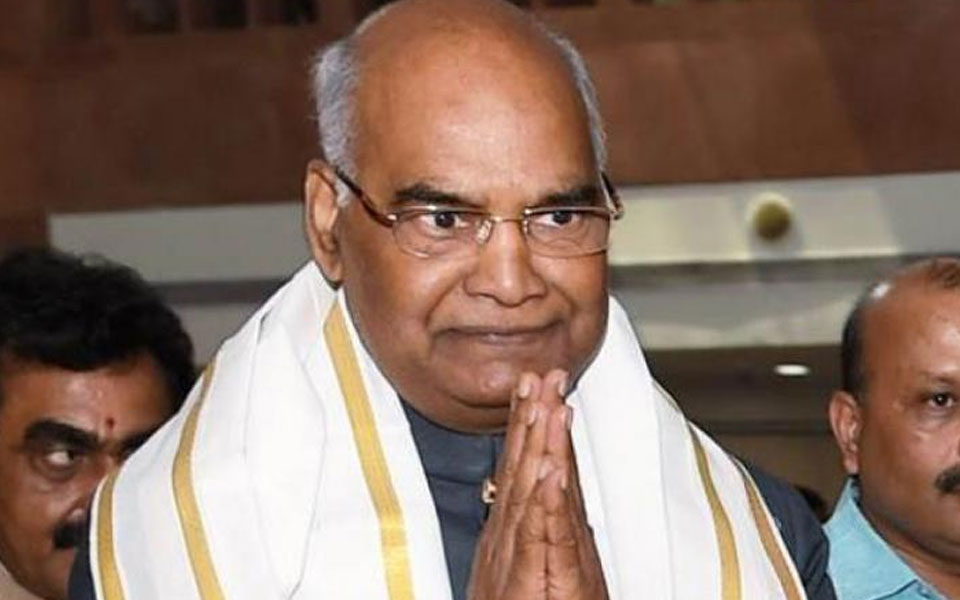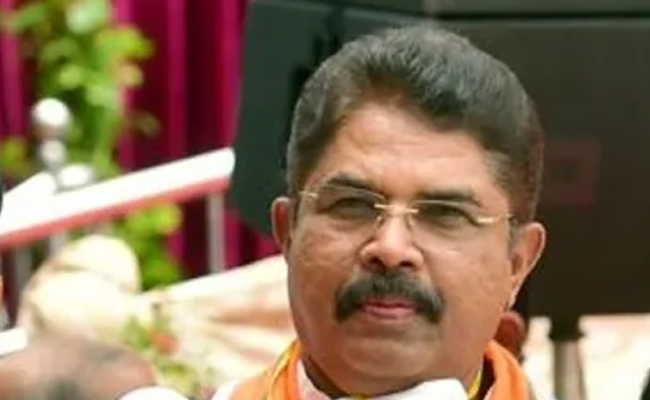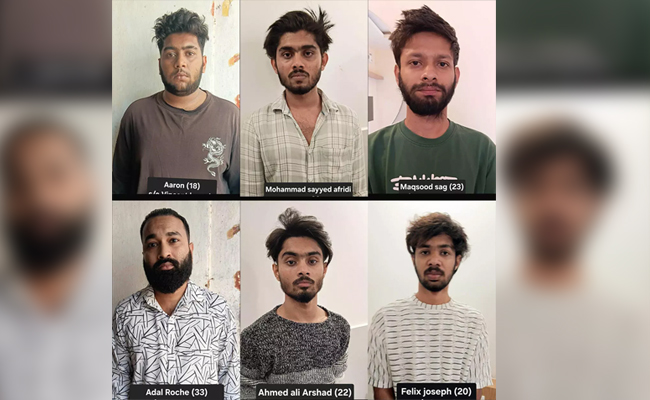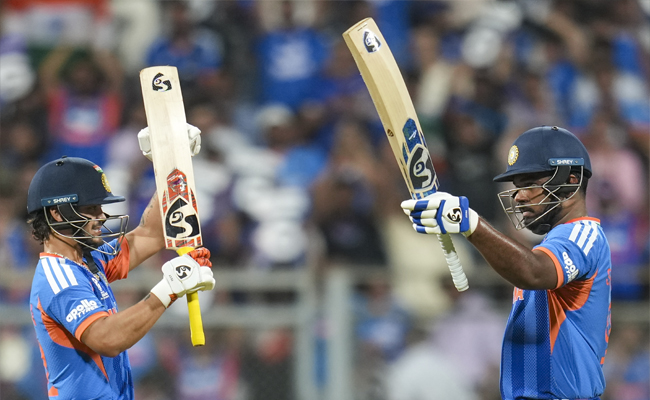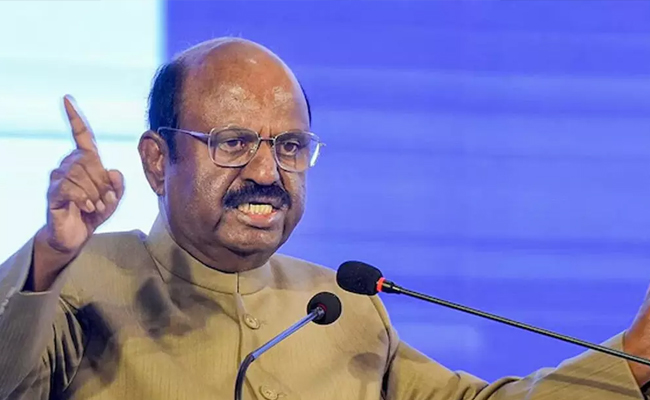New Delhi, July 1 : President Ram Nath Kovind said on Saturday that there were tectonic shifts taking place in the world, not just in the realm of geopolitics and geoeconomics, and managing India's rise in such an environment is not an easy task.
Addressing the participants of the annual Heads of Missions Conference who had called on him at Rashtrapati Bhavan, Kovind said the diplomats don't just represent the Indian state and the government of India but 1.3 billion Indians and their hopes and aspirations.
"There are tectonic shifts taking place in the world, and not just in the realm of geopolitics and geoeconomics. Technology, communication and societal mores are also changing rapidly. Terrorism and non-conventional threats pose a constant challenge to our security.A To manage India's rise in such an environment is not an easy task. You have to be a master at strategic thinking, nimble-footed action and be able to quickly adapt to change," he said.
The President said that the government has a clear and well marked approach to diplomacy today and the litmus test of the country's engagement with the external world is "what we are able to do to propel domestic growth and development".
"Our diplomats are doing well on this account. And as they do so, there is expectation for much more, especially when the country aspires for transformational change," he said.
The President said that the Indian growth story and the government's flagship programmes including Make in India, Digital India, Skill India, Smart Cities or Start-up India, have a multi-layered connect with the external world. "As diplomats, it is part of their mandate to secure new investments, scout for appropriate technologies, create markets for Make-in-India products and bring the best of business practices to India."
The President said that engaging different states of India is a vital part of diplomacy today. He stated that he sees real value of "twinning arrangements" in promoting people-to-people relations between our states and diaspora countries. "Today, there are higher expectations from us as a country from our citizens living outside."
Complimenting External Affairs Minister Sushma Swaraj, he said she has given a new confidence to Indians abroad in the ability of the government to reach out to them when in need. "Our Missions and our ambassadors are seen as responsive to public needs, always ready to give a helping hand to our citizens and to members of the Indian diaspora. Our E-Visa scheme has come in for praise," he said.
He said Indian diplomats represent a society that in its essence is a force for good and for stability in an unpredictable world.
"Do remember that you don't just represent the Indian state and the government of India. You represent 1.3 billion Indians, and their hopes and aspirations. You represent our diverse and plural culture, you represent the richness of our 5,000 year old civilization and you represent a society that in its essence is a force for good and for stability in an unpredictable world.
"All this places great responsibility upon each one of you. I am confident you will continue to fulfill that responsibility, as you always have, as professional diplomats and as selfless servants of India," he said.
Let the Truth be known. If you read VB and like VB, please be a VB Supporter and Help us deliver the Truth to one and all.
Bengaluru (PTI): Leader of Opposition in the Karnataka Assembly R Ashoka on Thursday took a dig at CM Siddaramaiah ahead of the state Budget presentation, claiming that the government is expected to borrow Rs 1.15 lakh crore and is likely to impose fresh taxes on the people.
He said the Budget would have nothing new, adding that its highlights would be criticism of Prime Minister Narendra Modi and repeated mentions of the five guarantee schemes ('Shakti', 'Gruha Lakshmi', 'Gruha Jyoti, 'Yuva Nidhi' and 'Anna Bhagya').
Chief Minister Siddaramaiah, who also holds the Finance portfolio, is scheduled to present the 2026–27 Budget on March 6. This will be his record 17th budget.
“Siddaramaiah-led Congress government’s budget will be presented tomorrow. While Finance Minister Nirmala Sitharaman reduced the tax burden in the Union Budget, Siddaramaiah is known for imposing taxes on people. He imposes about four taxes a month and has already introduced 36 taxes, and is now looking for ways to impose more,” Ashoka said.
Speaking to reporters, he said the Congress had promised people before coming to power that the guarantee schemes would be implemented without imposing any burden on them.
“By the end of the chief minister’s term, the state’s total debt will probably exceed Rs 6 lakh crore. The government has already breached financial discipline. Siddaramaiah and his government are somehow managing the situation,” Ashoka claimed, adding that his borrowings as CM equal those of 12 or 13 former chief ministers combined.
Stating that the Budget should create higher revenue sources, ensure that no burden is placed on people, and take the state away from debt, the opposition leader said this could be ensured only by a “clever and intelligent finance minister.”
“Anyone can run a government by pushing the state into debt,” he said, accusing Siddaramaiah of “increasing the state’s debt and failing to meet the expectations of the people.”
Highlighting that Siddaramaiah blames the previous BJP government for everything, Ashoka said Basavaraj Bommai, the chief minister during the previous BJP government, had presented a “surplus budget,” without excessive borrowings.
“Despite having the opportunity to borrow more while staying within the parameters of financial discipline, he (Bommai) did not do so, as it would burden the people,” he said, accusing Siddaramaiah of borrowing crores of rupees every year.
“I feel that this time too, he will take a loan of Rs 1.15 lakh crore,” he claimed.
The BJP leader said he had written to the CM requesting an allocation of Rs 15,000 crore annually for the development of backward taluks, as recommended by the High Power Committee on Redressal of Regional Imbalance (HPCRRI), chaired by economist Prof M Govinda Rao.
Claiming that the government appears “inactive” due to internal rifts, Ashoka pointed to an ongoing power struggle between factions led by Siddaramaiah and Deputy Chief Minister D K Shivakumar over the CM’s post.
“Amid all this, we cannot expect anything new from this Budget. The CM will repeatedly speak about the guarantee schemes and target the central government and PM Modi. Criticising Modi and repeated mentions of the five guarantee schemes will be the highlight of this Budget. Other than that, there will be nothing new,” he added.
He also dismissed the CM's claim that the government had achieved 90 per cent of the promises made in the previous Budget. “The fact is that not even 9 per cent has been achieved. I have evidence for it,” he said.
Ashoka further alleged that the government had also failed in tax collection, achieving only 48 per cent of the target, and had released less than 40 per cent of the allocated funds to some departments.

